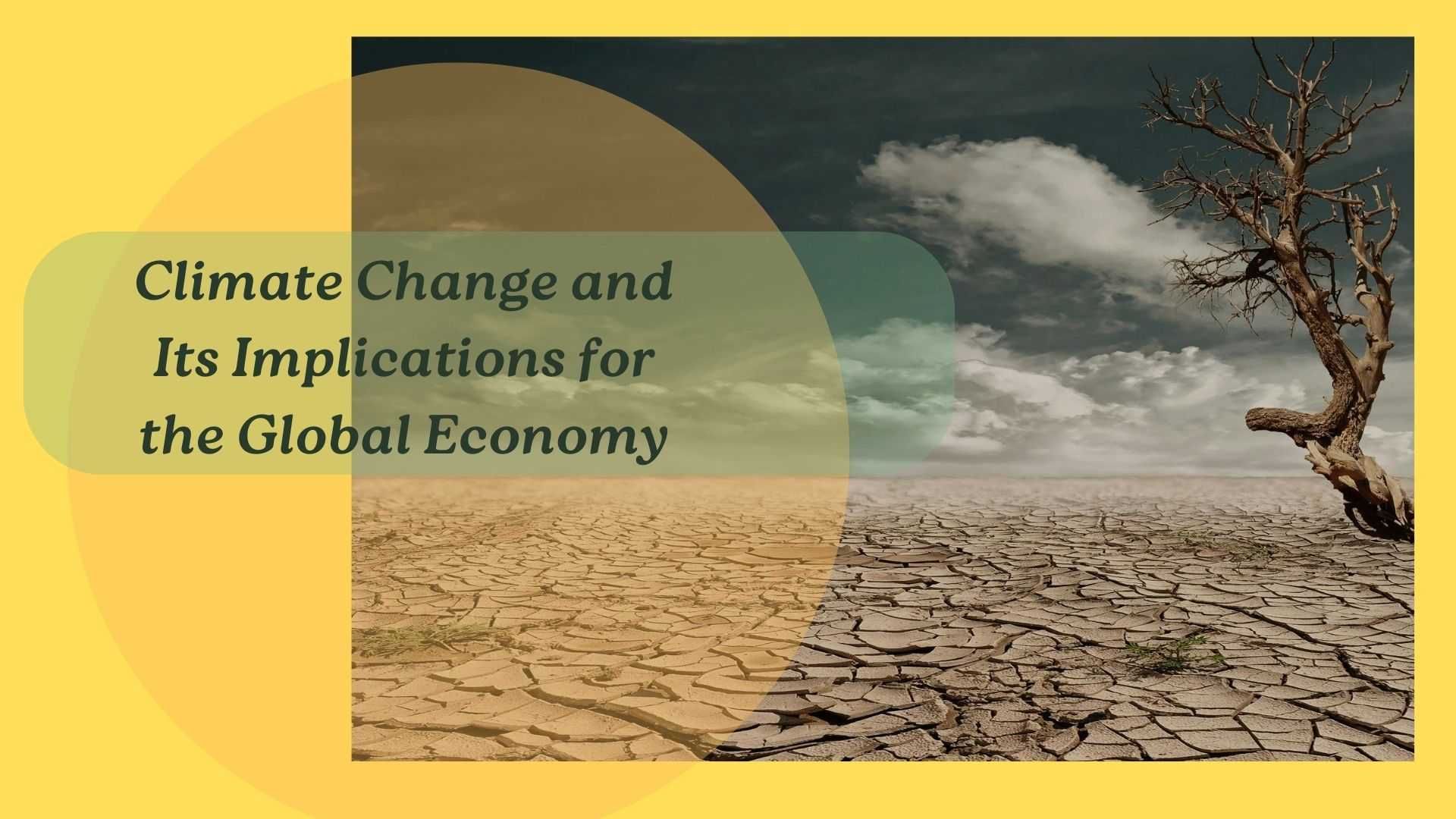Climate Change and Its Implications for the Global Economy
Climate change is one of the most pressing challenges of our time. Its effects are already visible in extreme weather events, rising sea levels, and changes in ecosystems. However, beyond environmental impacts, climate change has serious implications for the global economy that can affect jobs, the cost of living, and even the stability of entire countries.
In this blog post, we’ll explore how climate change impacts the economy, why businesses and governments are concerned, and what this means for people around the world.

1. Rising Costs of Extreme Weather Events
One of the most direct economic impacts of climate change is the increase in the frequency and intensity of extreme weather events, like hurricanes, wildfires, droughts, and floods. These events cause significant damage to homes, businesses, and infrastructure.
The cost of rebuilding after extreme weather events is high, and these expenses are often covered by taxpayer money, insurance companies, or businesses themselves. For example, wildfires in California and Australia have led to billions of dollars in losses, while hurricanes and floods have destroyed homes and forced people to relocate. As these events become more common, the costs will continue to rise, potentially leading to higher insurance premiums, taxes, or utility costs for everyone.
Global Impact:
Developing countries, which may lack the resources to recover from disasters, are particularly vulnerable. These nations often rely on agriculture, which is directly affected by weather patterns. When crops fail due to drought or floods, economies suffer, leading to higher food prices and even food shortages.
2. Impact on Agriculture and Food Prices
Agriculture is highly sensitive to climate conditions. Changes in temperature, rainfall, and the frequency of extreme events disrupt crop yields, making it harder to predict and produce enough food. Droughts in one region, for example, can lead to crop failures and affect global food supply, driving up prices.
For consumers, higher food prices mean a larger portion of household budgets goes to groceries. For farmers, unpredictable weather can mean lower income, as they lose crops or face reduced yields. Many farming communities also face a difficult choice: adapt to new conditions by investing in new equipment and techniques, or face reduced productivity.
Global Impact:
Food insecurity, or the inability to access sufficient nutritious food, is becoming a more pressing issue worldwide due to climate change. When basic food items become scarce, they cost more, and people in low-income areas are hit hardest. Food price spikes can also cause political instability, as seen in the Middle East during the Arab Spring, where rising food prices contributed to social unrest.
3. Strain on Infrastructure and Real Estate
Climate change can also affect infrastructure, including roads, buildings, and public utilities. As sea levels rise, coastal cities are particularly vulnerable. Properties in flood-prone areas, for instance, may lose value as flooding becomes more common, and insurance companies may be less willing to provide coverage.
Damage to infrastructure increases maintenance costs and may require new construction. Local governments often cover these costs through taxes, meaning citizens may face higher tax rates. For people living in high-risk areas, such as near coastlines or in wildfire-prone zones, home values may drop, and insurance rates could skyrocket, affecting the local real estate market and household wealth.
Global Impact:
Cities worldwide are already grappling with how to protect their infrastructure from climate-related damage. For example, New York City has invested billions to fortify against storm surges and flooding. These adaptations are necessary but expensive, diverting funds from other public services and projects.
4. Shifts in Job Markets
As climate change reshapes the global economy, it also reshapes job markets. Some industries will need to adapt, while others may decline entirely. For example, the shift from fossil fuels to renewable energy is likely to reduce demand for jobs in coal and oil while creating new opportunities in solar, wind, and other green technologies.
For workers, this shift presents both challenges and opportunities. Those in traditional energy sectors may need to retrain for green energy jobs. On the other hand, as renewable energy grows, so does the demand for jobs in installation, maintenance, and research, potentially creating millions of new jobs worldwide.
Global Impact:
In many countries, renewable energy jobs are on the rise, which may lead to economic growth in regions investing heavily in these sectors. Nations that transition to renewable energy can also become less dependent on imported fuels, potentially leading to greater economic stability and lower energy costs for consumers.
5. Impacts on Health and Productivity
Climate change has significant health implications, from respiratory illnesses due to poor air quality to heat-related illnesses and the spread of diseases in warmer climates. These health impacts not only affect quality of life but also have economic consequences.
Health problems reduce productivity, as people may need to take more sick days or work less effectively. Businesses and governments may face higher healthcare costs to treat these climate-related health issues. Additionally, extreme temperatures can make outdoor work unsafe, affecting industries like agriculture and construction.
Global Impact:
In many countries, rising temperatures are already impacting productivity and health. For instance, outdoor laborers in places like India and the Middle East face health risks during extreme heat waves, and this impacts their ability to work. These changes strain health systems and could lead to increased healthcare costs globally.
6. Changing Energy Markets and Costs
Energy production and consumption are major contributors to climate change, and as nations strive to reduce emissions, the energy market is changing. Shifts toward renewable energy sources like solar, wind, and hydropower are essential to curbing emissions, but they also bring economic changes.
For consumers, changes in energy policies and production can impact electricity prices. Renewable energy can be cheaper in the long run, but the transition involves upfront costs. For instance, investments in infrastructure for solar or wind power can lead to short-term price hikes, though they eventually lead to more affordable, sustainable energy options.
Global Impact:
Countries that invest heavily in renewable energy may become global leaders in clean technology, giving them an economic advantage. This shift could disrupt the global oil and gas market, impacting economies heavily dependent on fossil fuels, like Russia or Saudi Arabia, while benefiting those focused on renewable tech.
What Can We Do?
While the economic effects of climate change are serious, there are ways we can work to lessen these impacts:
- Support sustainable practices: Small choices add up, like reducing energy consumption, recycling, and supporting companies that prioritize sustainability.
- Advocate for policies: Voting and advocating for climate-focused policies encourage governments to prioritize sustainable practices and invest in clean energy.
- Educate ourselves and others: Understanding the economic implications of climate change can help us make informed choices as consumers, investors, and citizens.
Conclusion: Building a Resilient Economy in a Changing Climate
Climate change is not just an environmental issue—it’s an economic one. By recognizing its effects on agriculture, infrastructure, job markets, and more, we can better understand how to prepare for and adapt to these challenges. Governments, businesses, and individuals each have a role to play in building a resilient, sustainable economy that can thrive in a changing climate.
While the impacts of climate change are daunting, they also present opportunities for innovation and growth. The global shift towards renewable energy, sustainable practices, and climate-resilient infrastructure can create jobs, foster economic stability, and help protect our planet for future generations.


